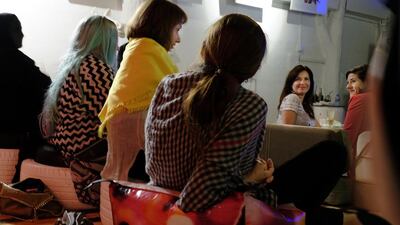ABU DHABI // Salama Al Shamsi has started the capital’s first documentary film club for women, adding a sense of mystery to each gathering and – at a recent meeting – a fine cup of coffee.
Doctors, curators, government directors and women from many other professions and backgrounds are gathering once a month to watch a documentary of Ms Al Shamsi’s choosing at venues around the capital.
“I don’t tell them what we are watching because some people might have watched it already and decide not to come. But what is important is the discussion after the documentary,” said the 31-year-old Emirati.
“If I say it’s about science some might say ‘not interested’ – but I want them learn about it even if they don’t like it.”
As the head of the Zayed National Museum project, Ms Al Shamsi is a frequent traveller who developed a passion for documentaries after exhausting all the movie options during back-to-back flights.
To share her passion, she came up with the idea of a documentary film club. To add a colourful touch, the venue for the screenings is always chosen to match the theme of the film.
The club’s first screening in July was held in “a very subtle and quiet room. It was empty and only had beanbags and projectors; it matched the content of the film, which was so peaceful,” she said.
The film was about self awareness and consciousness. She chose the topic when people started to leave work and school for their summer holidays because she wanted “to recharge everyone before coming back to work.”
On Wednesday, about 25 women gathered to watch a film about the life cycle of coffee and how it is produced in different parts of the world. The venue was a modern majlis-like room in the back of the Art House Cafe.
Hanan Sayed, a senior representative for Guggenheim Abu Dhabi, said she was interested to see where the film attributed the origins of coffee: Yemen or Ethiopia?
“I very much love to learn new things in the context of meeting new people, to talk about new ideas and not just empty talk,” said the Lebanese American. “Salama always promises a twist of food.”
After the film, Ms Al Shamsi asked everyone to describe how what they had viewed related to them personally.
“When I retire, I want to become a coffee taster,” said Mariam Al Mahmoud, an Emirati training director at a government entity.
Reem Al Shemari, a non-coffee drinker, said the film reminded her of the journey she had to take to find the best type of coffee to serve with her gluten-free bakery produce.
“The ceremony with the popcorn I did not understand it, I found that very strange” she said.
Marianne Auffret, a food and beverage manager at Etihad, was quick to explain that they do it with popcorn for the taste.
“I had a chance to go to Ethiopia and saw the ceremony. It is very simple. They even do it at home,” said the France native.
“They might find it strange when we have dates with coffee as well,” Ms Al Shamsi said.
In addition to the “Disneyland vision of coffee production” that Ms Auffret was offered, she said the film was politically correct in highlighting the struggles of coffee farmers to get their efforts recognised.
“Those producing and picking the coffee are not even tasting it and people miles and mile away are getting the benefit,” said Muneera Al Sayegh, a curator at Guggenheim Abu Dhabi.
Dr Hessa Al Mazrouei, a gynaecologist from the UAE, said she had tried every kind of coffee and the use of children and labourers was what stood out to her in the documentary.
She was also astonished that coffee was washed and not produced dry to maintain the aroma. “And in India, they walked over the coffee beans. I was fascinated by that.”
Following the discussion, a barista demonstrated how coffee is prepared at the cafe and offered a chance for the participants to make their own cup of joe.
hdajani@thenational.ae


